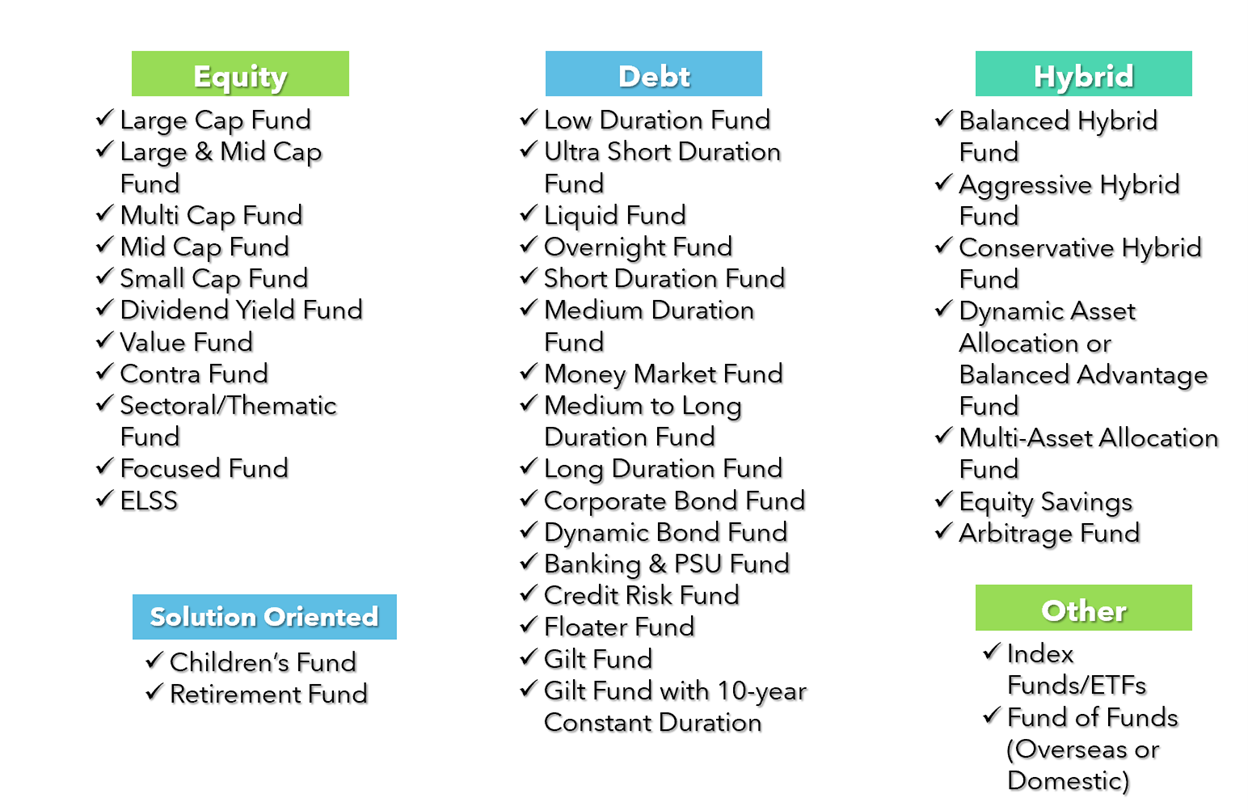- +91 7669266515
-

Mutual funds offer a way for a group of investors to effectively pool their money so they can invest in a wider variety of investment vehicles and take advantage of professional money management. Mutual fund companies essentially collect the money from their investors and invest that pooled money into individual investment vehicles according to scheme’s stated objective. It gives the market returns and not assured returns.
More & more people are learning about mutual funds as a means of investment. From putting one's money into fixed deposits or investing in real estate, people are becoming aware of mutual funds as lucrative choice of savings & investments. It is becoming the most sought-after method of investing but having limited or no knowledge of it can hamper one's plan to go ahead with mutual funds completely. We are a team of professionals which help in making your Mutual fund journey easy and rewarding.




Professional Management – Fund managers monitor the market and economic trends and analyze securities to make informed investment decisions.
Diversification – Mutual Funds offer investors an opportunity to diversify across assets depending on their investment needs.
Convenient Administration – lumpsum investments, monthly investments, automatic withdrawal plans, and automatic reinvestment of dividends.
Tax Benefits – The Income Tax Act provides various tax benefits on returns earned from investment in mutual funds. Tax saving Mutuals funds are part of eligibility for Investments under Section 80C.
Affordability – The minimum initial investment for a mutual fund is fairly low for most schemes (As low as Rs. 500/- for some schemes).
Liquidity (Subject to No Lock-in) – Investors can sell their units on any business day and receive the current market value of investments within a short period. Most of the Mutual funds does not have lock in.
Simplicity – Mutual Funds provide detailed reports and statements, making record-keeping simple.
Choice of schemes – Mutual Funds offer you a variety of investment options – like money market funds, debt funds, balance funds, equity funds, gold funds etc.


Systematic Investment Plan (SIP) is a very easy & convenient mode of making investments in mutual funds on a regular basis. SIP allows one to cultivate a habit of savings & creating wealth for the future by starting early. Offering ease & flexibility, through SIP one can create a planned approach towards investing right. SIP gets auto debited from the investors account and the amount is invested into a mutual fund scheme that has been specified. The investor then gets a certain number of units which is based on the current ongoing market rate. Every-time a SIP is made, additional units keep getting added to the investor’s account. SIP has proved to be an ideal choice of investments for retail investors who lack resources to pursue active investments.
Offering a hassle-free mode for investing, one can directly get the SIP amount deducted from one's bank account via a standing instruction to facilitate auto-debit function.
By investing through SIP, you commit to saving regularly. So, with SIP, one gets into a mode of disciplined savings along with creating a path of attaining one's financial objectives & goals.
With SIP, one can decide and increase/decrease the amount as they wish, although it is always recommended to continue SIP with a long-term perspective.
Investing with SIPs leads to long term gains because of the power of compounding & rupee cost averaging. Rupee cost averaging is an automated market timing technique that eliminates one's need to time the market.
Many investors now take the SIP (Systematic Investment Plan) route to begin their savings and take advantage of compounding returns in a best way. As SIP is considered as the most convenient way of investing in the equity markets, Financial Advisors suggest investors to opt for it. SIPs are generally advised to investors who look to invest a certain sum of money in mutual funds at regular intervals to build corpus for meeting any long term financial goals.
SIP allows investor to choose the mode of investment as per their convenience- monthly, quarterly or annually, for investing in funds of their choice. Investors can choose from various investment vehicles to invest their money including stocks, mutual funds, ETFs, etc.
SIP brings about a discipline in terms of investment habits. It helps the investor in maintaining a focused and dedicated approach towards investment. Starting with an amount as low as Rs.500-Rs.1000 per month, SIP offers a number benefits that make investment quite comfortable and enjoyable experience.
Why To Invest Via SIP?
As said above, SIPs are the best way to build a corpus, here let us glance as to why must one do so:
SIP has been proved to be the most ideal way of investing for retail investors who do not have the resources to pursue active investments.
SWP is a facility offered by mutual funds to enable the investors to redeem the units in small portions at regular intervals so that short term goals or monthly income needs are met. The intervals period can range from monthly or quarterly. SWPs are preferred choice by retired individuals as it can help in creating regular flow of income from their investment corpus in mutual funds. Other investors can opt for this to pay EMIs, pay bills, & to take care of other expenses.

SWP can be effectively used to make better use of surplus funds as it allows you to invest that amount in mutual fund schemes & facilitates withdrawal as per your requirement.
Tax Advantage:
When one withdraws through SWP, the amount is more tax efficient as compared to other traditional fixed instruments.
Fixed Income:
This facility is a good choice for those who are looking for regular income over a period.

STP is a way through which one invests a lumpsum amount in one scheme & regularly transfers a pre-defined amount into another scheme of the same mutual fund house. In the long run, STP helps in cutting down risks to a considerable level & earning good returns. Basically, STP means transferring an investment from one asset or asset type into another asset or asset type. This transfer process happens gradually over a period.
Helps in Re-balancing Portfolio
Through STP, one can balance their portfolio effectively as this method allows the allocation of investments from equity to debt or vice versa. If your investment equity goes up, then it can be switched from an equity to a debt fund.
Consistent Returns
Through STP one can transfer the set amount to a target equity fund while still being invested in a debt or liquid fund. So, an investor stands to gain benefit from the returns of the equity fund to which the funds are being transferred to & at the same time remain protected as a part of the investment remains in debt.
Averaging of Cost
STP helps in averaging out the cost as it assists in buying units when the rates are lower & vice versa.
ELSS OR Equity Linked Savings Scheme, as the name suggests, is an equity based mutual fund. Through ELSS, one can invest in tax saving mutual funds. There are many advantages to investing via ELSS like:
ELSS is an equity diversified fund & investors enjoy both the benefits of capital appreciation as well as tax benefits. But for long term, ELSS generate better returns though with slightly higher risk.
Here's some points of advantage one can derive by investing in ELSS:
Equity's Potential in Getting Return
Equities are known for giving potentially higher long-term gains compared to other tax saving instruments available in the market. So, with ELSS, one can more effectively & efficiently construct a portfolio keeping in mind the long-term perspective.
Tax Saving Instruments
Under section 80C, investments in ELSS are exempt from tax. And the returns received from equity funds after the end of 1 year is also tax free. As ELSS funds come with a lock in period of 3 years, the returns, dividends, capital gains also become tax free.
Outperforming Funds
If you want to save money & earn higher return of approximately 15 percent & more than ELSS funds are the way to go.
Financial Goal Planning
With inflation beating returns, ELSS funds are the best when it comes to long term financial planning. Under the guidance of an expert financial advisor, one can easily achieve the set goals of buying their dream home, children’s education, wedding, car & much more.
Less Lock in Duration
ELSS funds have a 3-year lock in period, which is less as compared to other investment avenues like PPF, FDs, NSC.
Investment Option
One has an option of either investing in one go i.e. lumpsum amount or can opt for SIP. SIP or Systematic Investment Planning is where a certain amount gets deducted from your account monthly.


B-520, Tower B Logix Technova Plot No. 44 Sector - 132 Noida - 201305, India
B - 134, Third Floor DDA Shed Okhla Industrial Area, Phase - 1 New Delhi – 110020
C-107, 1st Floor, Tower C Noida One, Block B, Sector 62, Noida, U.P- 201309
Mon - Sat : 10:00 AM to 6:00 PM
Sunday : Closed
Copyright © Money4Smart Private Limited. All rights reserved.